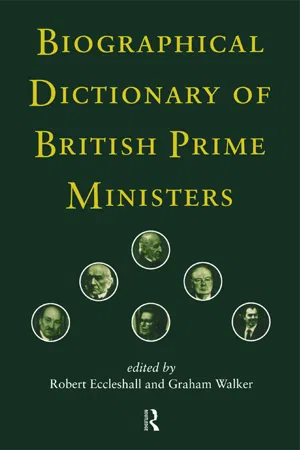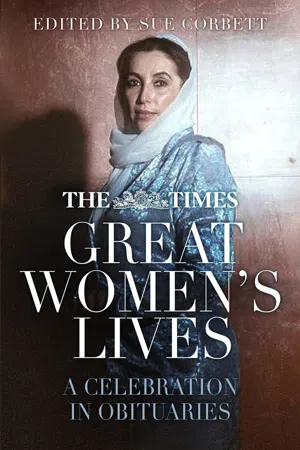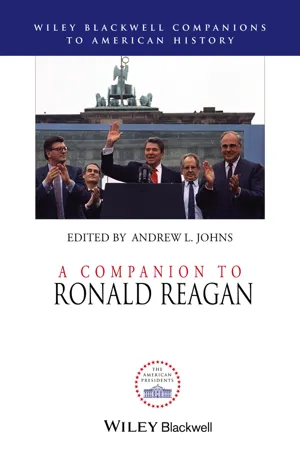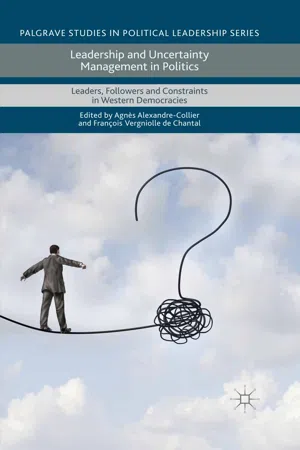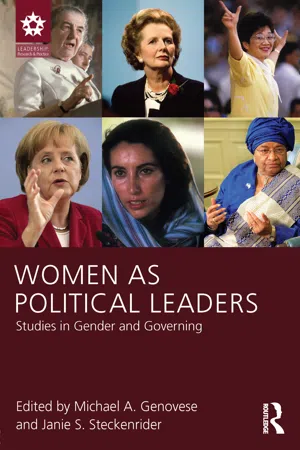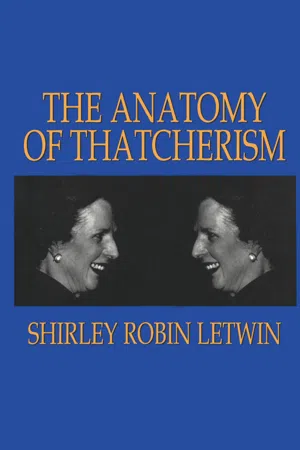Politics & International Relations
Margaret Thatcher
Margaret Thatcher was the first female Prime Minister of the United Kingdom, serving from 1979 to 1990. She was known for her conservative policies, free-market economic reforms, and strong stance against communism. Thatcher's leadership style and policies, often referred to as Thatcherism, had a significant impact on British politics and international relations during the late 20th century.
Written by Perlego with AI-assistance
Related key terms
7 Key excerpts on "Margaret Thatcher"
- Robert Eccleshall, Graham Walker(Authors)
- 2002(Publication Date)
- Routledge(Publisher)
Sybil, and whose strident pursuit of a misconceived national interest left Britain isolated and derided abroad.Thatcher’s legacy is ambiguous. Her counter-revolutionary project to restore to Britain the competitive spirit and international influence of the Victorian age revived a sense that the nation could be steered in a purposive direction instead of being buffeted by the storms of economic vicissitude and the demands of sectional interests. Political scientists no longer lamented, as they were prone to do during the Heath and Callaghan administrations, that the country had become ungovernable, and Thatcher won sneaking admiration from some on the left who by no means shared her distaste for collectivism. Yet her libertarian impulse to create ‘the first post-socialist society’ by curtailing the functions of government resulted, paradoxically, in a state that was more centralized and bureaucratic, and less tolerant of certain individual liberties, than the regime she inherited. And her confrontational demeanour, fundamentalist rhetoric and ultimate inability to reconcile the various groups within the broad church of Conservatism, left the party more divided than at any time since the repeal of the Corn Laws.Not that it immediately collapsed after her political demise. Major’s unexpected victory in the general election of 1992 obscured the situation that Thatcher had brought about. But Major’s premiership, during which he presided over the fag-end of the Thatcherite agenda, revealed lingering wounds which some claimed— perhaps with a touch of hyperbole—signalled the party’s terminal decline. Peel was less ideologically vociferous than Thatcher. Yet for whatever reasons—stub-born refusal to compromise over matters of principle, increasing remoteness from many of the parliamentary party, lack of diplomacy— two commanding prime ministers bequeathed to their successors bickering, dispirited factions. It remains to be seen whether post-Thatcher Conservatives are quicker to re-form themselves into a strong organization with a unity of purpose than were their predecessors after the débâcle of 1846.- eBook - ePub
The Times Great Women's Lives
A Celebration in Obituaries
- Sue Corbett(Author)
- 2014(Publication Date)
- The History Press(Publisher)
BARONESS THATCHERINDOMITABLE PRIME MINISTER WHOSE UNSWERVING BELIEF IN FREE ENTERPRISE TRANSFORMED THE POLITICAL AND SOCIAL LANDSCAPEAPRIL 9, 2013Margaret Thatcher was one of the greatest British politicians of the 20th century. The first woman prime minister in Europe, she held the job for 11 years. In the 20th century no other prime minister had been in office for such a long unbroken period, and no one since Lord Liverpool (1812-27) had had such a long continuous run as Prime Minister.She led the Conservative Party for 15 years, won three general elections in succession, and never lost a significant vote in the House of Commons. Since Walpole in effect invented the role, only six men have served for longer than her as prime minister: Walpole himself, Pitt, Lord Liverpool, Lord Salisbury, Gladstone and Lord North. She fully earned her place in this company.Thatcher set out, first as party leader and then as prime minister, to overturn the consensus that had shaped postwar British politics and to replace it with a more competitive ethos of free enterprise.She wanted to rescue Britain from the debilitated state to which she believed it had been reduced by socialism and, in the words of her last bravura speech as Prime Minister to the House of Commons, to give back “control to people over their own lives and over their livelihood”.It was a paradox of British politics that Thatcher, suspicious of government, made activist government possible again after a decade or more in which it seemed that the abuse of union power had rendered Britain ungovernable. A country that had become resigned to genteel decline was for a time imbued by Thatcher with a confidence in its ability to succeed economically and to take a leading role in the defence of the West.Thatcher did not succeed in all her objectives. Argument will continue to focus on the extent of the improvement in Britain’s underlying economic performance under her premiership, on the marginalisation of Britain within the European Union, and on the divisiveness occasioned by her abrasive approach to social policy and, indeed, to politics as a whole. But the scale and permanence of her impact on British politics can be judged by the move of the Labour Party under three successive leaders — Kinnock, Smith and Blair — back into the centre ground, and by the moderate, market-orientated and fiscally cautious policies of the Blair administration elected in 1997. Her opponents attacked her furiously even while implicitly accepting much of her reshaping of the country’s political landscape. It was a tribute she accepted with ironic satisfaction. - eBook - ePub
- Andrew L. Johns(Author)
- 2015(Publication Date)
- Wiley-Blackwell(Publisher)
Chapter Thirty-One Margaret Thatcher Michael F. Hopkins Few British political leaders have achieved widespread recognition among the American population. Even David Lloyd George, Britain's leader during the First World War and the last liberal prime minister (1916–1922), is largely unknown. Towering above all others is Winston Churchill, prime minister during World War II. Only one other figure comes close to the same level of prominence: Margaret Thatcher. In May 1979 she became the first—and so far the only—female prime minister of Britain. She won reelection in 1983 and in 1987, holding her post until November 1990. This was the longest period in office of any premier whose whole term fell in the twentieth century. Lord Salisbury, who was prime minister for over 13 years, straddled the nineteenth and twentieth centuries. Thus Thatcher's term overlapped with the presidency of Ronald Reagan, who served from January 1981 until January 1989. Reagan and Thatcher shared the same ideological outlook. Ideological agreement has not always produced good relations, but in this case the two established a very good relationship, both personally and politically. In their different ways, they were both outsiders from the mainstream of their parties, and this shared experience helped bring them closer. Margaret Thatcher: A Career Conspectus Margaret Hilda Roberts was born on October 13, 1925, in Grantham, Lincolnshire, the second daughter of Alfred and Beatrice Ethel (née Stephenson) Roberts. Her father, who owned two grocery shops, was a Methodist lay preacher and local politician and was an important influence in her life. He figures prominently in her memoir of her early life, The Path to Power (Thatcher, 1995), while her mother appears rather less. This prompted an unconvincing psychobiography of Thatcher by the Labour Party politician Leo Abse (1989) - eBook - ePub
Leadership and Uncertainty Management in Politics
Leaders, Followers and Constraints in Western Democracies
- François Vergniolle De Chantal, Agnès Alexandre-Collier, Agnès Alexandre-Collier(Authors)
- 2015(Publication Date)
- Palgrave Macmillan(Publisher)
This chapter explores political leadership in the light of the theoretical framework provided by works of reference and contributes to this book’s attempt to analyse the dynamic relationship between the leader and his/her followers. It focuses on the premierships of Margaret Thatcher and John Major, trying to assess the influence of their respective leaderships on the particular sphere of European policy. Political leadership and the European issue played a decisive part in both their premierships, albeit in different ways, as will be demonstrated below.The first part analyses and compares the leadership styles of Margaret Thatcher and John Major, considering the influence of these particular approaches on the decision-making processes favoured by both Prime Ministers. European policy being the main focus here, their respective visions of Europe will also be examined, with consideration given to questions concerning the role of personal leadership and the agency of the two political leaders. The second part will study the impact of political leadership on European policy-making – at the European level but also at national and party levels. As leadership appears inextricably linked to the European issue for both Margaret Thatcher and John Major, the relationship between the leader and his/her followers will be analysed and differentiated. How did political leadership and Europe interact under Thatcher and Major? How do both Prime Ministers fit within the typology provided by the authors in the introduction to this book?Divergent leadership styles, converging European visions
First of all, the leadership styles of Margaret Thatcher and John Major were diametrically opposed. Margaret Thatcher was a conviction politician characterised by strong leadership and determination, as epitomised in the appellation ‘the Iron Lady’. She came to power with a radical political agenda; she broke with the consensus which had prevailed since the Second World War in British political life, establishing a new political order – which makes her akin to the ‘Reconstruction’ leader identified by Stephen Skowronek in his typology of American presidents (Skowronek, 1997). Not only was Margaret Thatcher a charismatic leader as defined by Max Weber (Weber, 2004: 133–45), she was also a ‘transforming leader’ according to the theoretical framework provided by James Burns: ‘Such leadership occurs when one or more person engage - eBook - ePub
Women as Political Leaders
Studies in Gender and Governing
- Michael A. Genovese, Janie S. Steckenrider(Authors)
- 2013(Publication Date)
- Routledge(Publisher)
Thatcher's early foreign policy goals were clear: increase defense spending, maintain a nuclear arms deterrent, support the United States, oppose the Soviet Union and communism, support NATO, but maintain cool relations regarding Britain's membership in the European Economic Community (EEC). But Thatcher's policy goals were very quickly overshadowed by her style in foreign affairs: resolute, unyielding, nationalistic, rigid. It was not long before the sobriquet “the Iron Lady,” given to Thatcher by the Soviet news agency, TASS, became both a fitting appellation and a description of her style of governing.After 11 years in office, Thatcher faced several seemingly intractable foreign policy problems. She was unable to make headway with the problems of Northern Ireland (Ogden, 1990, chap. 13 ), faced severe criticism for her support of the white minority government in South Africa, and stubbornly fought the move to a more truly united European Community, leaving Britain outside the inner circle as Europe moved toward unity in 1992.On the more positive side of the foreign policy ledger, Thatcher was successful at strengthening the already strong ties between Britain and the United States. In fact, so close was Margaret Thatcher to Ronald Reagan that the mutual fawning society between the two leaders, while it helped both leaders in their respective countries, actually masked a deeper unease that Thatcher felt toward Reagan (Wapshott, 2008). While Thatcher and Reagan competed in public to see who could heap higher praise on the other, in private Thatcher had grave doubts about Reagan's ability. “Poor dear,” she once said, “there's nothing between his ears.” After a meeting with Reagan, Thatcher remarked, “Not much gray matter, is there?” (Ogden, 1990, chap. 14).Thatcher's relationship with Mikhail Gorbachev and the Soviet Union represents one of the few cases in which she actually changed her mind. Beginning her term as a rabid anti-Communist, Thatcher was captivated by Gorbachev, concluding, “We can do business together,” and indeed Thatcher helped persuade Ronald Reagan that he too could do business with Gorbachev (Ogden, 1990, chap. 18). - eBook - ePub
- Shirley Robin Letwin(Author)
- 2018(Publication Date)
- Routledge(Publisher)
15 Others, who emphasize the influence of the American economist Milton Friedman, equate Thatcherism with monetarism and regard strict control of the money supply as the defining objective of Thatcherism. Some charge that the adherence to monetarism prevented Thatcherites from responding flexibly to practical problems, while others argue that the abandonment of monetarism, which had produced the economic miracles of the early eighties, gave rise to the difficulties of the late eighties. Although some of those who equate Thatcherism with an economic doctrine are its most stalwart admirers, others conclude that Thatcherism thus introduced right-wing ideological politics into Britain.A more colourful, and wholly different because irrational, character is assigned to Thatcherism by those who see it as a drive for power. In one version, the emphasis falls on Margaret Thatcher’s personal ambition. She is portrayed as a ‘ruthless crusading leader who knew she was right and had a supreme duty to remain in power’. According to this view, Thatcherism is nothing like an ideology or any other ‘system of ideas’. It is rather driven and shaped by ambition of ‘the small town variety’ than which ‘there is none more ardent’. The ambition is allied to certain instincts which, being ‘narrow in range’ and ‘dogmatically voiced’, created the illusion of a doctrine. But it was not because she was a ‘conviction politician’ or an ‘ideologue engaged on some lifelong crusade’ that Mrs Thatcher set out ‘to kill socialism’. She was really moved by the ‘natural antagonism’ of the lower middle class to the working classes and their allies, the upper middle class intelligentsia.16In other words, here Thatcherism is the creed of an extremely ambitious small-town girl, a workaholic with lower-middle-class prejudices, who found an outlet for her formidable energies in the war on socialism.17 - eBook - ePub
Thatcherism in the 21st Century
The Social and Cultural Legacy
- Antony Mullen, Stephen Farrall, David Jeffery, Antony Mullen, Stephen Farrall, David Jeffery(Authors)
- 2020(Publication Date)
- Palgrave Macmillan(Publisher)
union leaders. It is said that she was harsh, but she made us face reality, and reality was harsh. Those who did not like facing reality projected their hatred of reality on to her. The human cost of facing up to reality would have been much less if previous Governments had not, for reasons of false analysis and cowardice, failed to deal with those realities earlier. If blame is due for the fact that any harshness materialised, it is due to her predecessors rather than to her. Those who hated reality, who hated being proved wrong and who hated seeing their illusions shattered transferred their hatred to her. Fortunately, she was big and strong enough to act as a lightning rod for their feelings.This has been a remarkable day—one that none of us who has sat through it will ever forget. It has been a great parliamentary occasion for a great parliamentarian. I am sure that Baroness Thatcher, as a great parliamentarian, would appreciate how the debate has been conducted. Much has been said about the battles that Margaret Thatcher fought. She certainly did not shy from the fight and that led to arguments, but what is remarkable is how many of those arguments are no longer arguments at all. So many of the principles that Lady Thatcher fought for are now part of the accepted political landscape of our country. Very few of her major policies—I can hardly think of any—were reversed by the Governments who succeeded hers. The change that she made to the face of Britain was complete. Everything that she stood for will survive her. The unwavering conviction that Lady Thatcher possessed so magnificently sets an example for every generation. What we miss from politics today is her certainty, her seriousness, her clarity of principle, her fusion of the practical with her sense of moral purpose. I believe that the Prime Minister, and many who sit behind him, were inspired by Margaret Thatcher , and that many of the politics in which she believed have found its way into our Government. In different ways, I believe that we are taking forward her legacy.”Question put and agreed to.
Learn about this page
Index pages curate the most relevant extracts from our library of academic textbooks. They’ve been created using an in-house natural language model (NLM), each adding context and meaning to key research topics.
